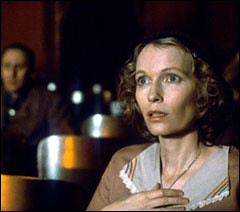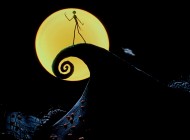Stop and Smell the Purple Rose of Cairo
review of THE PURPLE ROSE OF CAIRO
by Zach Malm
starring Mia Farrow and Jeff Daniels
directed by Woody Allen
Rated PG
Trailer: [Youtube]guLFLWYlQxU[/Youtube]
Woody Allen’s magical ode to the transporting power of cinema, The Purple Rose of Cairo has been called one of 100 greatest films ever made (according to Time Magazine). I call it one of my favorite movies ever, and probably the film I’ve recommended to friends and strangers alike more than any other. So why is it that I’ve only met a few people who’ve heard of it, much less seen it? I don’t know if it’s just fallen through the cracks over the years, or if it’s always been a bit of a neglected gem, but I do know that every person who’s followed up on my recommendation has thanked me wholeheartedly later.
The Purple Rose of Cairo has a rather unique ability to appeal to fans of Woody Allen as well as his detractors.  That’s most likely because he doesn’t appear in the film, but it’s also because the film is full of energy, wit, and warmth. It’s also quite deep, touching on issues of God, free will, and human imperfection.
That’s most likely because he doesn’t appear in the film, but it’s also because the film is full of energy, wit, and warmth. It’s also quite deep, touching on issues of God, free will, and human imperfection.
Set during the Depression, the film follows Cecilia (Mia Farrow), a waitress struggling to get by with no help from her comfortably unemployed husband Monk (Danny Aiello), a brutish loser who, despite chasing girls and shooting dice all day, still manages to find the time to ignore his wife’s needs. Seeking an escape, she is a regular at the local movie theatre, often seeing the features multiple times. One day, after being fired for her clumsiness and coming home to find Monk drunk with another woman, Cecilia goes to see a movie, a globetrotting adventure called The Purple Rose of Cairo. After sitting through the movie several times, something strange happens. The main character, Tom Baxter (Jeff Daniels), a young explorer in a pith helmet, starts forgetting his lines. Obviously distracted, he eventually stops altogether, and addressing Cecilia, steps out of the screen.
At this point, the film could go in all sorts of directions. What Allen decides to play with is the very literal contrast between fantasy and reality. The other theatre patrons stay glued to their seats,  watching the other characters on screen argue about which character is more important, and whether or not they should try to escape as well. The theatre owner interprets the film to be irreparably damaged by the loss of the character, and calls the distributor to complain. Word reaches the producer, and eventually the actor who played Tom, Gil Shepherd (also played by Jeff Daniels). Gil is devastated, having been so proud of the believability of the character he’d created, but now seeing it turn on him, and by leaving the film, threaten to destroy his budding career.
watching the other characters on screen argue about which character is more important, and whether or not they should try to escape as well. The theatre owner interprets the film to be irreparably damaged by the loss of the character, and calls the distributor to complain. Word reaches the producer, and eventually the actor who played Tom, Gil Shepherd (also played by Jeff Daniels). Gil is devastated, having been so proud of the believability of the character he’d created, but now seeing it turn on him, and by leaving the film, threaten to destroy his budding career.
On the flip side, Tom is a character, and only knows the world of his movie. “Dad was a card,” he tells Cecilia at one point. “I never met him, though. He died before the movie begins.” Tom wanders around in his pith helmet, doing what comes naturally to him: exploring. He learns that when you kiss in real life, the screen doesn’t fade to black, and that when you jump behind the wheel of a random car, it doesn’t just go, not without a key. He meets a prostitute (played by the wonderful Dianne Wiest, in an early role) and, entirely ignorant about her line of work, accompanies her to her brothel, where he leads the girls into a sincere conversation about the beauty of life, and specifically children,  a subject they have different kinds of experience with, despite the fact that their career requires them to separate the act of sex from its natural associations of love and children.
a subject they have different kinds of experience with, despite the fact that their career requires them to separate the act of sex from its natural associations of love and children.
At one point, Tom and Cecilia duck into a church. Tom is unfamiliar with the concept of God, since theology doesn’t play a part in his movie. Cecilia tells him that God created all of us. Tom thinks he understands, and says that God must be like the screenwriter behind The Purple Rose of Cairo. “No, it’s much bigger than that,” Cecilia corrects him. “Think for a minute. A reason for everything. Otherwise it’d be like a movie with no point, and no happy ending.”
Eventually, Gil Shepherd, the actor, comes to town to track down his character, fearful that he’s out committing atrocities whilst looking exactly like Gil and possessing Gil’s fingerprints. He first finds Cecilia, and is taken by her for probably the reasons that Tom was. This leads to an argument, where Cecilia appears to have to choose to be with Gil or Tom. “Tell him you don’t love him,” says an exasperated Gil. “You can’t love him. He’s fictional. Do you want to waste your time with a fictional character? I mean, you’re a sweet girl, but you deserve an actual human.” “But, Tom’s perfect,” replies Cecilia. “Yeah, but he’s not real. What good is perfect if the man’s not real?”
Chasing the perfect mirage takes up a large part of many people’s lives, and Christians are not exempt.  In our pride, we keep holding out for perfection in others, but justify our own sin. Cecilia’s husband, Monk, isn’t perfect. He’s anything but perfect, and he does sin against her continually, but he is her husband. She took a vow. And now, not only is she running to the movies to escape her marriage, she starts running around town with two (identical) men. At one point, as she’s running out the door, Monk tells her, “This isn’t the movies. This is real life,” and though we the audience don’t like him, and don’t want him to be right, he is.
In our pride, we keep holding out for perfection in others, but justify our own sin. Cecilia’s husband, Monk, isn’t perfect. He’s anything but perfect, and he does sin against her continually, but he is her husband. She took a vow. And now, not only is she running to the movies to escape her marriage, she starts running around town with two (identical) men. At one point, as she’s running out the door, Monk tells her, “This isn’t the movies. This is real life,” and though we the audience don’t like him, and don’t want him to be right, he is.
Jesus told us in Matthew 5:48, “Be perfect, therefore, as your heavenly Father is perfect.” The point here is that only God is perfect, and we are not, but we should seek perfection. The more we seek his perfection, the clearer we see our own imperfection, and the more he works on our heart, turning his desire into our desires. Cecilia is chasing a perfection that doesn’t exist. God is real, and he is worth chasing. As Gil tells Cecilia, “The most human of attributes is our ability to choose.” Choose well.



A great movie, and a good review that explains some good spiritual themes. I haven’t seen this one since college, but now I want to go rent it again. Thanks, Zach!
I don’t think I can accept your recommendation of this one. I can’t stand Woody Allen, and even if he doesn’t appear in the film, just knowing that it’s got his fingerprints on it scares me away. That and the fact that the plot reminds me too much of the Last Action Hero. I can’t bring myself to watch it.
This film is beautiful and always a joy to watch. Thank you for sharing your thoughts!
I have to say that the ‘Last Action Hero’ comment is pretty hilarious. I guess in concept they are somewhat similar, but PLEASE know that they are in fact far different films. It saddens me that I have to fear recommending this great movie to folks because of Woody Allen’s association with it. His personal life aside – I find him a filmmaker well worth studying. Over the years he has made several films that are really great. Don’t completely shut him out!